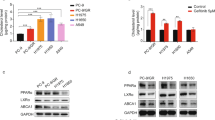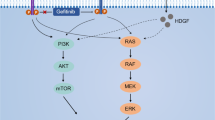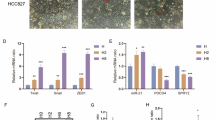Abstract
Most gefitinib-treated patients with non-small cell lung cancer (NSCLC) would eventually develop resistance. Lysimachia capillipes (LC) capilliposide extracts from LC Hemsl. show both in vitro and in vivo anti-cancer effects. In this study we investigated whether LC capilliposide in combination with gefitinib could overcome the resistance of NSCLC cells to gefitinib and identified the signaling pathways involved. Treatment with LC capilliposide alone inhibited the growth of a panel of NSCLC cell lines (PC-9, H460, H1975, H1299 and PC-9-GR) sensitive or resistant to gefitinib with IC50 values in the range of μg/mL. In the gefitinib-resistant PC-9-GR cells (which have a T790M EGFR mutation), LC capilliposide (at the IC30, i.e.1.2 μg/mL) markedly enhanced the inhibitory effects of gefitinib with its IC50 value being decreased from 6.80±1.00 to 0.77±0.12 μmol/L. By using the median effect analysis we showed that combination treatment of LC capilliposide and gefitinib could restore gefitinib sensitivity in PC-9-GR cells. Furthermore, LC capilliposide (1.2 μg/mL) significantly increased the apoptotic responses to gefitinib (0.77 μmol/L) in PC-9-GR cells, but did not affect gefitinib-induced G0/G1 arrest. Moreover, LC capilliposide (1.2 μg/mL) in combination with gefitinib (0.77, 1.0 μmol/L) markedly decreased the phosphorylation of the EGFR downstream signaling molecule AKT, which neither LC capilliposide nor gefitinib alone affected. In PC-9-GR cells with siRNA knockdown of AKT, addition of LC capilliposide was unable to increase gefitinib sensitivity. In a PC-9-GR xenograft mouse model, combination treatment with LC capilliposide (15 mg·kg−1·d−1, ip) and gefitinib (50 mg·kg−1·d−1, ip) dramatically enhanced tumor growth suppression (with a TGI of 109.3%), compared with TGIs of 22.6% and 56.6%, respectively, in mice were treated with LC capilliposide or gefitinib alone. LC capilliposide can restore the cells' sensitivity to gefitinib through modulation of pAKT levels, suggesting that a combination of LC capilliposide and gefitinib may be a promising therapeutic strategy to overcome gefitinib resistance in NSCLCs with a T790M mutation.
Similar content being viewed by others
Log in or create a free account to read this content
Gain free access to this article, as well as selected content from this journal and more on nature.com
or
References
Siegel RL, Miller KD, Jemal A . Cancer statistics, 2016. CA Cancer J Clin 2016; 66: 7–30.
Yang P, Allen MS, Aubry MC, Wampfler JA, Marks RS, Edell ES, et al. Clinical features of 5,628 primary lung cancer patients: experience at Mayo Clinic from 1997 to 2003. Chest 2005; 128: 452–62.
O'Rourke N, Macbeth F . Is concurrent chemoradiation the standard of care for locally advanced non-small cell lung cancer? A review of guidelines and evidence. Clin Oncol (R Coll Radiol) 2010; 22: 347–55.
Socinski MA, Evans T, Gettinger S, Hensing TA, Sequist LV, Ireland B, et al. Treatment of stage IV non-small cell lung cancer: diagnosis and management of lung cancer, 3rd ed: American College of Chest Physicians evidence-based clinical practice guidelines. Chest 2013; 143: e341S–68S.
Bradley CJ, Given CW, Roberts C . Disparities in cancer diagnosis and survival. Cancer 2001; 91: 178–88.
Bazley LA, Gullick WJ . The epidermal growth factor receptor family. Endocr Relat Cancer 2005; 12 Suppl 1: S17–27.
Wells A . EGF receptor. Int J Biochem Cell Biol 1999; 31: 637–43.
Arteaga CL . Overview of epidermal growth factor receptor biology and its role as a therapeutic target in human neoplasia. Semin Oncol 2002; 29: 3–9.
Yarden Y . The EGFR family and its ligands in human cancer. Signalling mechanisms and therapeutic opportunities. Eur J Cancer 2001; 37 Suppl 4: S3–8.
Shigematsu H, Lin L, Takahashi T, Nomura M, Suzuki M, Wistuba, II, et al. Clinical and biological features associated with epidermal growth factor receptor gene mutations in lung cancers. J Natl Cancer Inst 2005; 97: 339–46.
Riely GJ, Politi KA, Miller VA, Pao W . Update on epidermal growth factor receptor mutations in non-small cell lung cancer. Clin Cancer Res 2006; 12: 7232–41.
Fukuoka M, Yano S, Giaccone G, Tamura T, Nakagawa K, Douillard JY, et al. Multi-institutional randomized phase II trial of gefitinib for previously treated patients with advanced non-small-cell lung cancer (The IDEAL 1 Trial) [corrected]. J Clin Oncol 2003; 21: 2237–46.
Perez-Soler R, Chachoua A, Hammond LA, Rowinsky EK, Huberman M, Karp D, et al. Determinants of tumor response and survival with erlotinib in patients with non-small-cell lung cancer. J Clin Oncol 2004; 22: 3238–47.
Shepherd FA, Rodrigues Pereira J, Ciuleanu T, Tan EH, Hirsh V, Thongprasert S, et al. Erlotinib in previously treated non-small-cell lung cancer. N Engl J Med 2005; 353: 123–32.
Thatcher N, Chang A, Parikh P, Rodrigues Pereira J, Ciuleanu T, von Pawel J, et al. Gefitinib plus best supportive care in previously treated patients with refractory advanced non-small-cell lung cancer: results from a randomised, placebo-controlled, multicentre study (Iressa Survival Evaluation in Lung Cancer). Lancet 2005; 366: 1527–37.
Gazdar AF . Activating and resistance mutations of EGFR in non-small-cell lung cancer: role in clinical response to EGFR tyrosine kinase inhibitors. Oncogene 2009; 28 Suppl 1: S24–31.
Su KY, Chen HY, Li KC, Kuo ML, Yang JC, Chan WK, et al. Pretreatment epidermal growth factor receptor (EGFR) T790M mutation predicts shorter EGFR tyrosine kinase inhibitor response duration in patients with non-small-cell lung cancer. J Clin Oncol 2012; 30: 433–40.
Kosaka T, Yatabe Y, Endoh H, Yoshida K, Hida T, Tsuboi M, et al. Analysis of epidermal growth factor receptor gene mutation in patients with non-small cell lung cancer and acquired resistance to gefitinib. Clin Cancer Res 2006; 12: 5764–9.
Shih JY, Gow CH, Yang PC . EGFR mutation conferring primary resistance to gefitinib in non-small-cell lung cancer. N Engl J Med 2005; 353: 207–8.
Han SW, Kim TY, Hwang PG, Jeong S, Kim J, Choi IS, et al. Predictive and prognostic impact of epidermal growth factor receptor mutation in non-small-cell lung cancer patients treated with gefitinib. J Clin Oncol 2005; 23: 2493–501.
Hirsh V . Next-generation covalent irreversible kinase inhibitors in NSCLC: focus on afatinib. BioDrugs 2015; 29: 167–83.
Solca F, Dahl G, Zoephel A, Bader G, Sanderson M, Klein C, et al. Target binding properties and cellular activity of afatinib (BIBW 2992), an irreversible ErbB family blocker. J Pharmacol Exp Ther 2012; 343: 342–50.
Sequist LV, Yang JC, Yamamoto N, O'Byrne K, Hirsh V, Mok T, et al. Phase III study of afatinib or cisplatin plus pemetrexed in patients with metastatic lung adenocarcinoma with EGFR mutations. J Clin Oncol 2013; 31: 3327–34.
Wu YL, Zhou C, Hu CP, Feng J, Lu S, Huang Y, et al. Afatinib versus cisplatin plus gemcitabine for first-line treatment of Asian patients with advanced non-small-cell lung cancer harbouring EGFR mutations (LUX-Lung 6): an open-label, randomised phase 3 trial. Lancet Oncol 2014; 15: 213–22.
Engel J, Lategahn J, Rauh D . Hope and disappointment: covalent inhibitors to overcome drug resistance in non-small cell lung cancer. ACS Med Chem Lett 2016; 7: 2–5.
Barf T, Kaptein A . Irreversible protein kinase inhibitors: balancing the benefits and risks. J Med Chem 2012; 55: 6243–62.
Tan CS, Gilligan D, Pacey S . Treatment approaches for EGFR-inhibitor-resistant patients with non-small-cell lung cancer. Lancet Oncol 2015; 16: e447–59.
Yver A . Osimertinib (AZD9291)–a science-driven, collaborative approach to rapid drug design and development. Ann Oncol 2016 2016; 27: 1165–70.
Liang B, Zhang L, Tian J, Xu L, Yang S . Isolation and characterization of two new saponins from Lysimachia capillipes. Carbohydr Res 2006; 341: 2444–8.
Tian JK, Xu LZ, Zou ZM, Yang SL . Two new triterpene saponins from Lysimachia capillipes. J Asian Nat Prod Res 2006; 8: 439–44.
Xu Y, Rong Y, Liu X, Ying HM . Experimental studies on anti-tumor effects of capilliposide. Chin Pharmacol Bull 2012; 28: 545–9.
Tian JK, Xu LZ, Zou ZM, Yang SL . Three novel triterpenoid saponins from Lysimachia capillipes and their cytotoxic activities. Chem Pharm Bull (Tokyo) 2006; 54: 567–9.
Ying H, Qi Z, Guo D, Yu T, Zhang L, Tian J . Quantitative determination of capilliposide B and capilliposide C in Lysimachia capillipes by HPLC-ELSD assay. Chin Pharm J 2011; 46: 704–6.
Fei ZH, Wu K, Chen YL, Wang B, Zhang SR, Ma SL . Capilliposide isolated from Lysimachia capillipes Hemsl induces ROS generation, cell cycle arrest, and apoptosis in human nonsmall cell lung cancer cell lines. Evid Based Complement Alternat Med 2014; 2014: 497456.
Zhang S, Zheng X, Huang H, Wu K, Wang B, Chen X, et al. Afatinib increases sensitivity to radiation in non-small cell lung cancer cells with acquired EGFR T790M mutation. Oncotarget 2015; 6: 5832–45.
Kahan BD, Kramer WG . Median effect analysis of efficacy versus adverse effects of immunosuppressants. Clin Pharmacol Ther 2001; 70: 74–81.
Mitsudomi T, Morita S, Yatabe Y, Negoro S, Okamoto I, Tsurutani J, et al. Gefitinib versus cisplatin plus docetaxel in patients with non-small-cell lung cancer harbouring mutations of the epidermal growth factor receptor (WJTOG3405): an open label, randomised phase 3 trial. Lancet Oncol 2010; 11: 121–8.
Mok TS, Wu YL, Thongprasert S, Yang CH, Chu DT, Saijo N, et al. Gefitinib or carboplatin-paclitaxel in pulmonary adenocarcinoma. N Engl J Med 2009; 361: 947–57.
Mitsudomi T, Yatabe Y . Mutations of the epidermal growth factor receptor gene and related genes as determinants of epidermal growth factor receptor tyrosine kinase inhibitors sensitivity in lung cancer. Cancer Sci 2007; 98: 1817–24.
Takeda M, Okamoto I, Fujita Y, Arao T, Ito H, Fukuoka M, et al. De novo resistance to epidermal growth factor receptor-tyrosine kinase inhibitors in EGFR mutation-positive patients with non-small cell lung cancer. J Thorac Oncol 2010; 5: 399–400.
Pallis A, Briasoulis E, Linardou H, Papadimitriou C, Bafaloukos D, Kosmidis P, et al. Mechanisms of resistance to epidermal growth factor receptor tyrosine kinase inhibitors in patients with advanced non-small-cell lung cancer: clinical and molecular considerations. Curr Med Chem 2011; 18: 1613–28.
Yamada T, Matsumoto K, Wang W, Li Q, Nishioka Y, Sekido Y, et al. Hepatocyte growth factor reduces susceptibility to an irreversible epidermal growth factor receptor inhibitor in EGFR-T790M mutant lung cancer. Clin Cancer Res 2010; 16: 174–83.
Kono SA, Marshall ME, Ware KE, Heasley LE . The fibroblast growth factor receptor signaling pathway as a mediator of intrinsic resistance to EGFR-specific tyrosine kinase inhibitors in non-small cell lung cancer. Drug Resist Updat 2009; 12: 95–102.
Gadgeel SM, Wozniak A . Preclinical rationale for PI3K/Akt/mTOR pathway inhibitors as therapy for epidermal growth factor receptor inhibitor-resistant non-small-cell lung cancer. Clin Lung Cancer 2013; 14: 322–32.
Huang L, Fu L . Mechanisms of resistance to EGFR tyrosine kinase inhibitors. Acta Pharm Sin B 2015; 5: 390–401.
Engelman JA, Janne PA . Mechanisms of acquired resistance to epidermal growth factor receptor tyrosine kinase inhibitors in non-small cell lung cancer. Clin Cancer Res 2008; 14: 2895–9.
Li H, Schmid-Bindert G, Wang D, Zhao Y, Yang X, Su B, et al. Blocking the PI3K/AKT and MEK/ERK signaling pathways can overcome gefitinib-resistance in non-small cell lung cancer cell lines. Adv Med Sci 2011; 56: 275–84.
Niu FY, Wu YL . Novel agents and strategies for overcoming EGFR TKIs resistance. Exp Hematol Oncol 2014; 3: 2.
Samatar AA, Poulikakos PI . Targeting RAS-ERK signalling in cancer: promises and challenges. Nat Rev Drug Discov 2014; 13: 928–42.
Rosell R, Karachaliou N, Morales-Espinosa D, Costa C, Molina MA, Sansano I, et al. Adaptive resistance to targeted therapies in cancer. Transl Lung Cancer Res 2013; 2: 152–9.
Moniz S, Jordan P . Emerging roles for WNK kinases in cancer. Cell Mol Life Sci 2010; 67: 1265–76.
Lenertz LY, Lee BH, Min X, Xu BE, Wedin K, Earnest S, et al. Properties of WNK1 and implications for other family members. J Biol Chem 2005; 280: 26653–8.
Hsiao WL, Liu L . The role of traditional Chinese herbal medicines in cancer therapy — from TCM theory to mechanistic insights. Planta Med 2010; 76: 1118–31.
Parekh HS, Liu G, Wei MQ . A new dawn for the use of traditional Chinese medicine in cancer therapy. Mol Cancer 2009; 8: 21.
Acknowledgements
This work was supported by the Natural Science Foundation of Zhejiang Province (LY15H160010), the Medical Science Foundation of Zhejiang Province (2014KYA178), the Hangzhou Key Disease and Discipline Foundation (20140733Q15), and the Science and Technology Project of Zhejiang Provincial Bureau (2015ZA133).
Author information
Authors and Affiliations
Corresponding author
Supplementary information
Supplementary Figure S1
The phospho-kinase array also showed a significant decrease of AKT phosphorylation in PC-9-GR cells treated with the combination of gefitinib and LC capilliposide when compared to that of gefitinib treatment alone. (JPG 156 kb)
Supplementary Figure S2
Cotreatment with gefitinib and LC capilliposide had no obvious effects on the body weight of mice with PC-9-GR xenografts. (JPG 82 kb)
Supplementary Table S1
IHC analysis of tumor sections showing modulation of pEGFR, Ki67, CC3, and pAKT treated with LC capilliposide and gefitinib. (DOC 16 kb)
Rights and permissions
About this article
Cite this article
Zhang, Sr., Xu, Ys., Jin, E. et al. Capilliposide from Lysimachia capillipes inhibits AKT activation and restores gefitinib sensitivity in human non-small cell lung cancer cells with acquired gefitinib resistance. Acta Pharmacol Sin 38, 100–109 (2017). https://doi.org/10.1038/aps.2016.116
Received:
Accepted:
Published:
Issue date:
DOI: https://doi.org/10.1038/aps.2016.116
Keywords
This article is cited by
-
Capilliposide A attenuates diabetic nephropathy via modulation of NF-κB/TLR4 and apoptotic pathways
Scientific Reports (2025)
-
Natural compounds as potential anticancer agents aimed at ovarian cancer stem cells
Phytochemistry Reviews (2025)
-
Inhibitor of ghrelin receptor reverses gefitinib resistance in lung cancer
Human Cell (2019)



